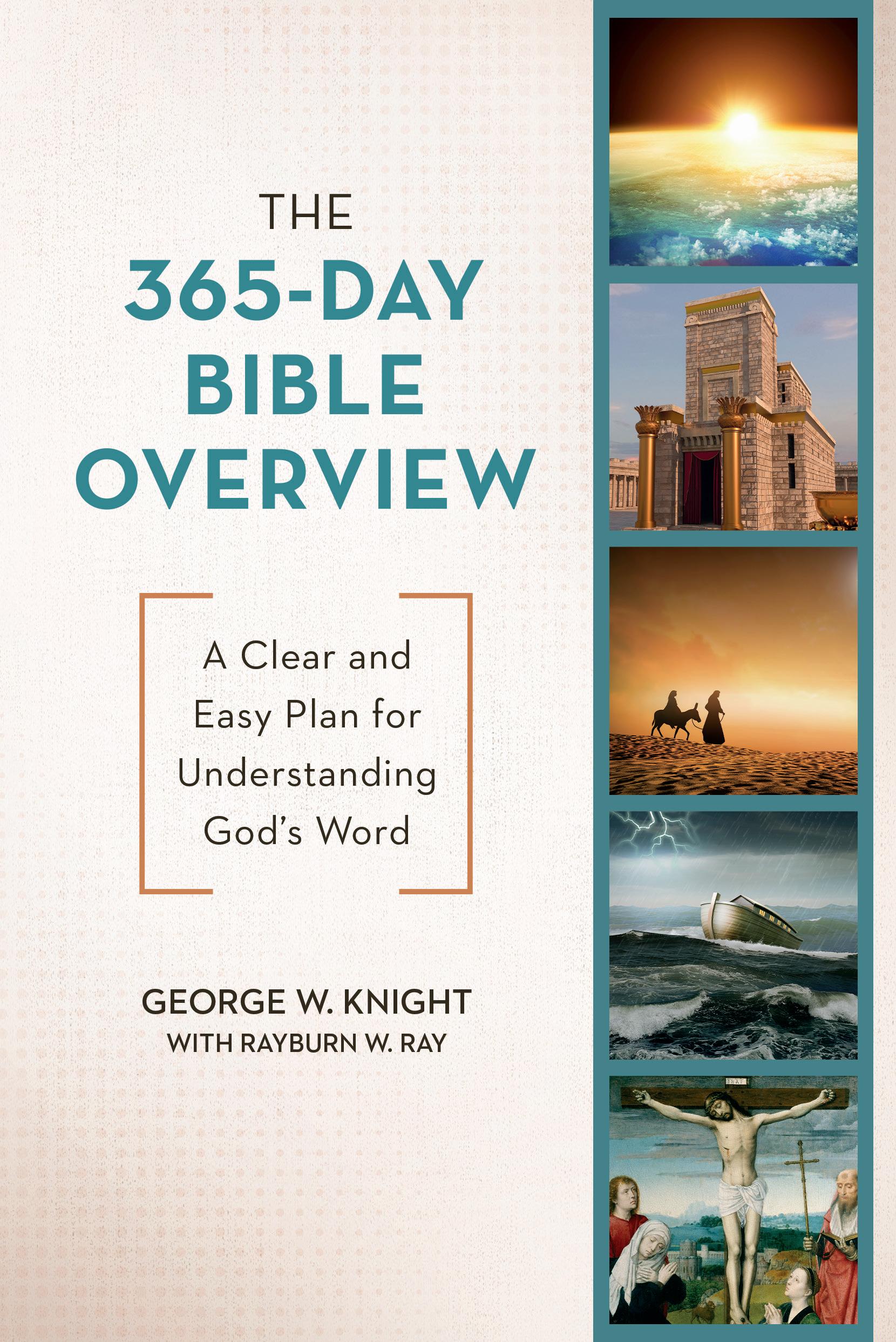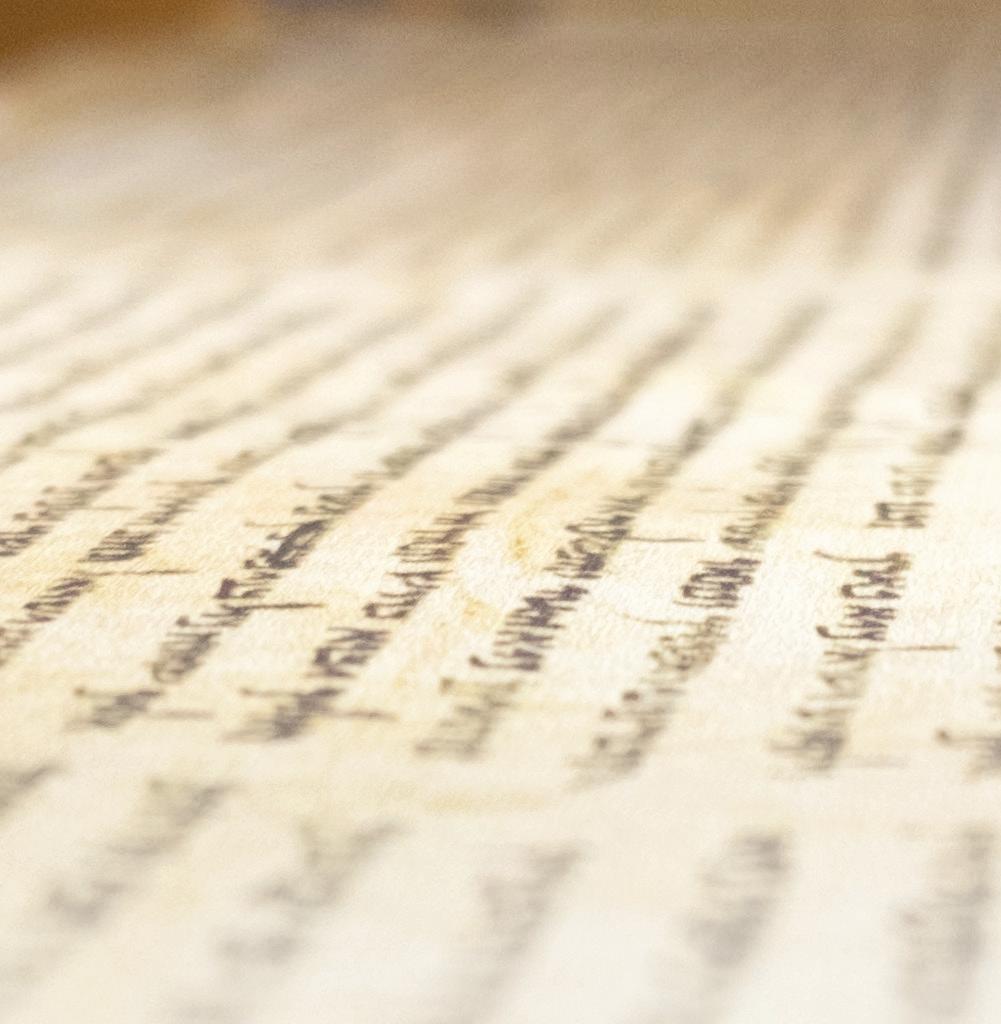THE OLD TESTAMENT
The Bible has two grand divisions—the Old Testament and the New Testament. The Old Testament is the larger of these two divisions, containing more than twice as much material as the New Testament. The thirty-nine individual Old Testament books were written under the inspiration of the Lord across a period of many centuries by several different authors. The Old Testament also contains many different types of literature: law, history, poetry, prophecy, and wisdom writings. The word testament means “covenant.” The Old Testament tells how God called a people, the nation of Israel, to live in covenant with Him.


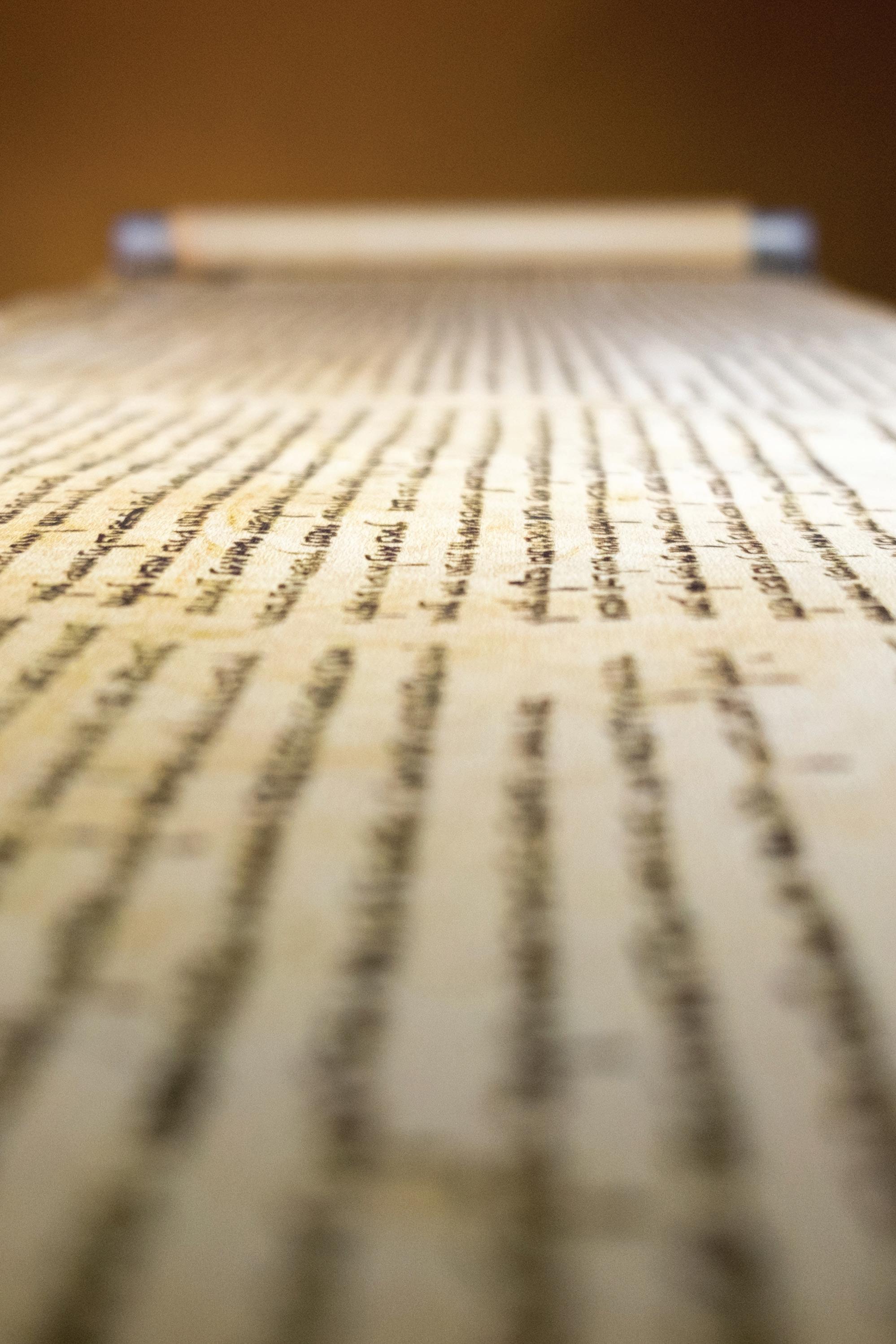

The five major divisions of the Old Testament are:
1. Books of the Law—Genesis, Exodus, Leviticus, Numbers, Deuteronomy
2. Historical books—Joshua, Judges, Ruth, 1 and 2 Samuel, 1 and 2 Kings, 1 and 2 Chronicles, Ezra, Nehemiah, Esther
3. Books of poetry and wisdom—Job, Psalms, Proverbs, Ecclesiastes, Song of Solomon
4. Books of the major prophets—Isaiah, Jeremiah, Lamentations, Ezekiel, Daniel

5. Books of the minor prophets—Hosea, Joel, Amos, Obadiah, Jonah, Micah, Nahum, Habakkuk, Zephaniah, Haggai, Zechariah, Malachi

Additional information on each division follows.



KEY

■ Scripture Passage Summary
■ Bible Definitions
■ Local and Biblical Customs



6 | GEORGE W. KNIGHT
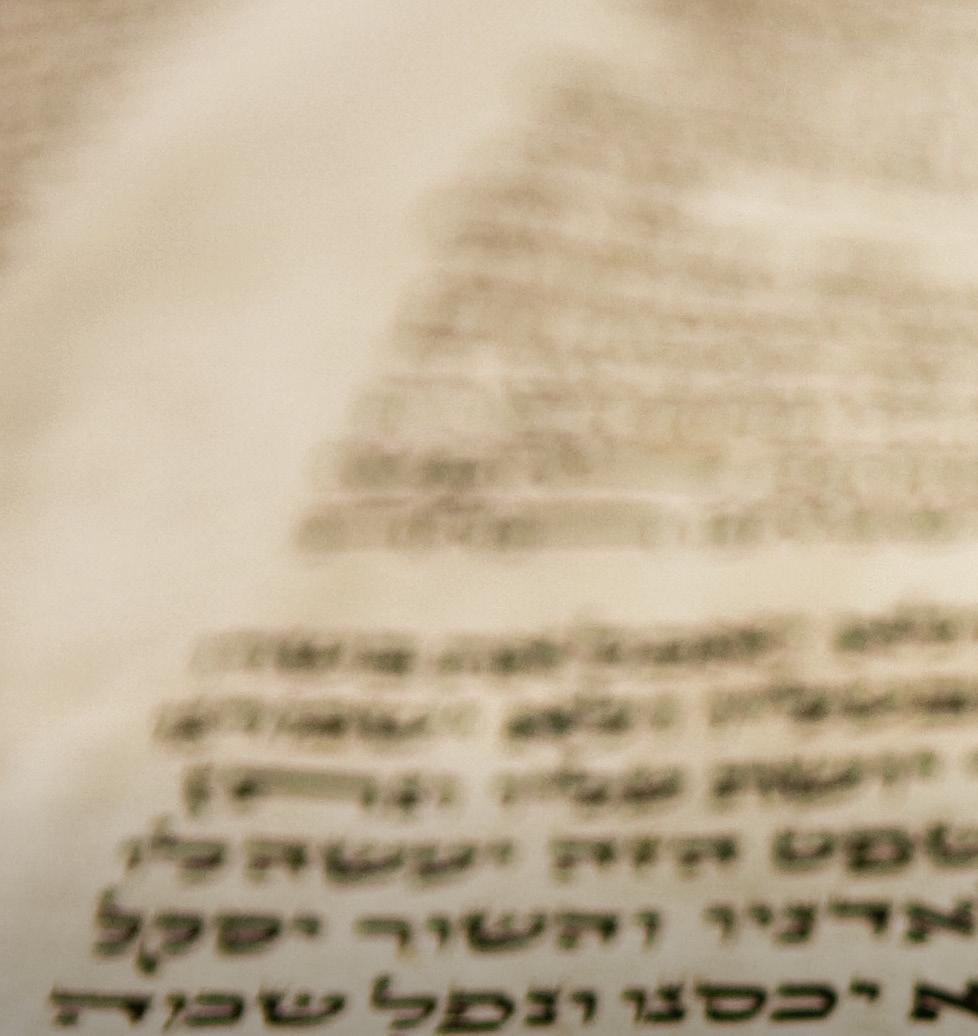
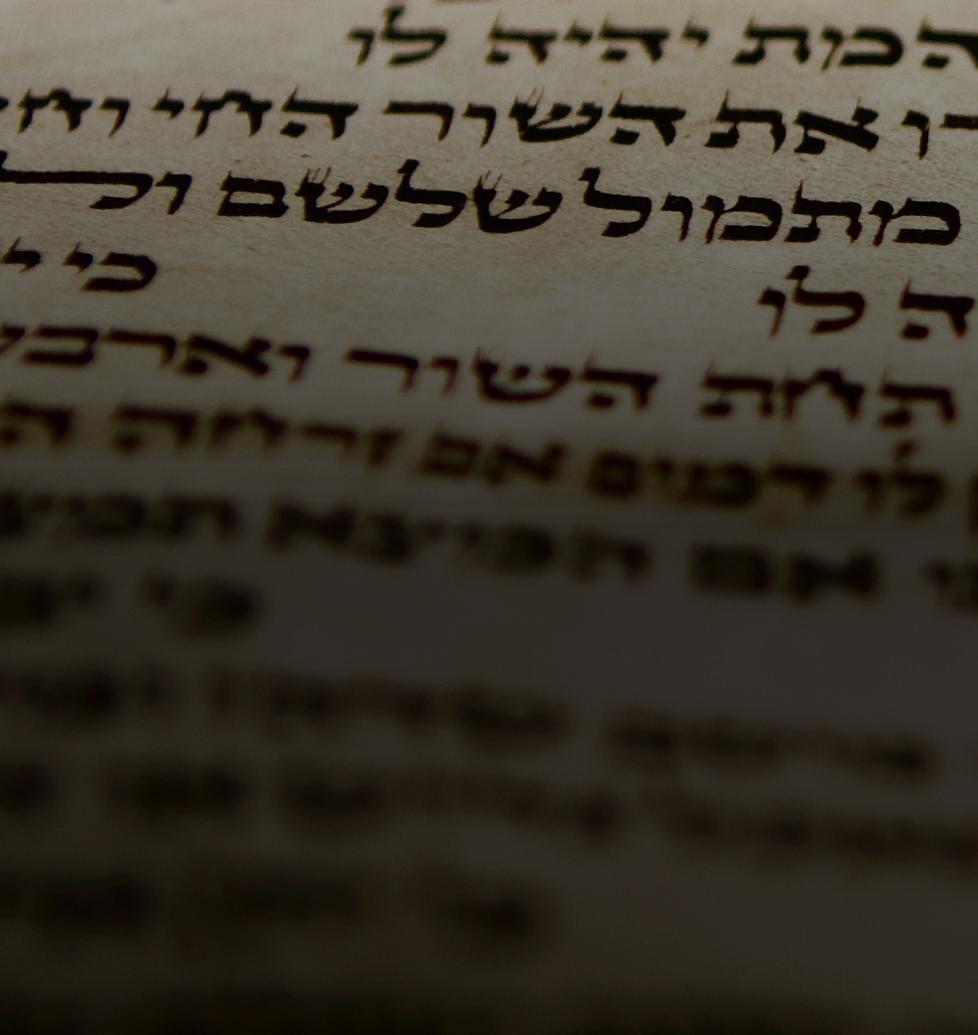
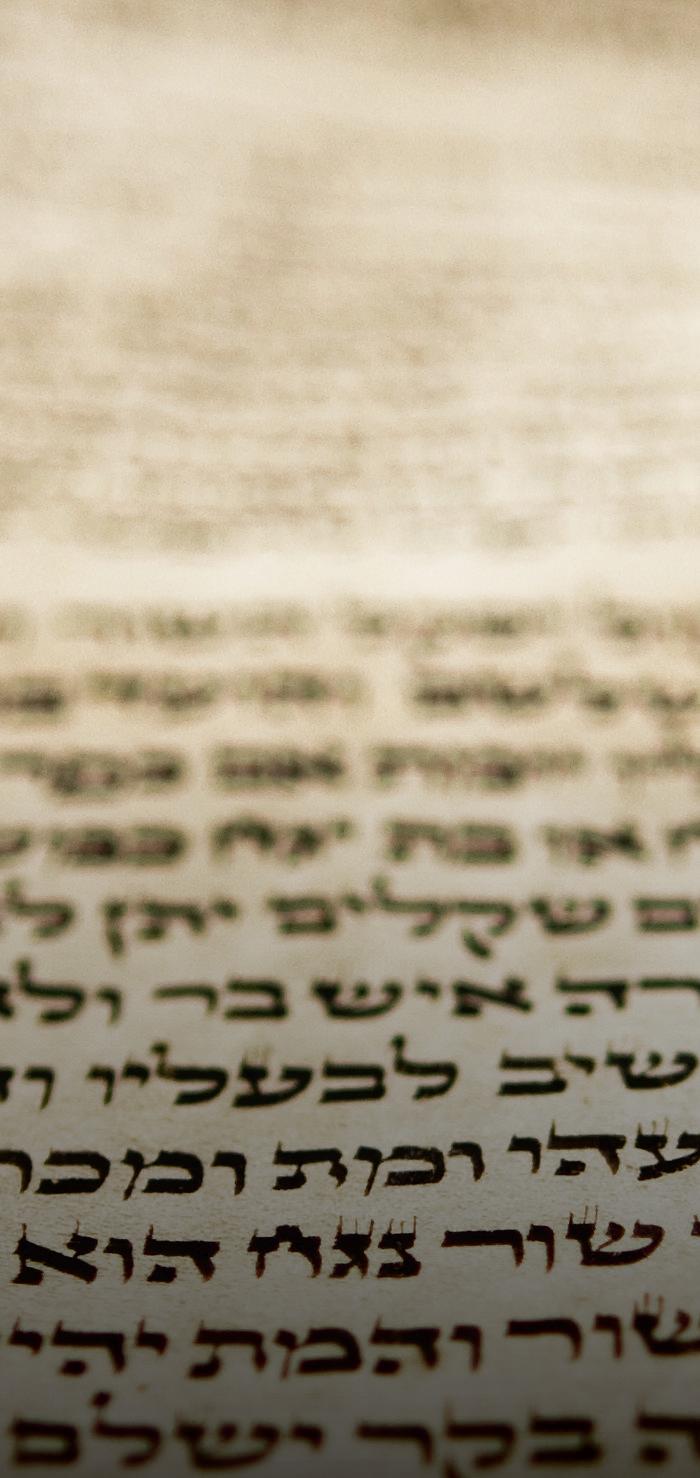
BOOKS OF THE LAW
The first five books of the Old Testament are known as the “Books of the Law.” This title is appropriate because the laws and commands of God are the central theme of this section of the Old Testament. God revealed to Moses His expectations of the nation of Israel. Moses recorded these commands as laws in the books of Exodus, Leviticus, Numbers, and Deuteronomy. Genesis contains no specific laws, but it does describe the covenant relationship that God established with His people, the Israelites. This covenant relationship demanded loyalty and obedience from God’s chosen people.

These first five books of the Old Testament are also known as the Pentateuch, a Greek term meaning “five-volumed.” These five books together take us from the creation of the physical world through the formation of the nation of Israel under the leadership of Moses.

JANUARY 1 | Read Genesis 1–3
1:1–31 God creates the world in six days (Heb. 1:10).
2:1–25 God creates Adam and Eve, the first man and woman.
3:1–24 Adam and Eve disobey God by eating the forbidden fruit and are cast out of the Garden of Eden.
Creation The actions of God through which He brought man and the physical world into existence. God existed before the world, and He produced the universe from nothing (Gen. 1:1–2). As the sovereign, self-existing God, He also rules over His creation (Ps. 47:7–9).
Adam The first man. Created in God’s image (Gen. 1:26–27), Adam was an upright and intelligent being (Gen. 2:19–20)—the first worker (Gen. 2:8, 15) and the first husband (Gen. 2:18–25). He received God’s law (Gen. 2:16–17) and knowingly sinned, along with Eve (Gen. 3:6). Their sin resulted in broken fellowship with the Creator (Gen. 3:8) and brought God’s curse (Gen. 3:14–19) and eviction from Eden (Gen. 3:22–24). Adam fathered Cain and Abel (Gen. 4:1–2), Seth (Gen. 4:25), and other children (Gen. 5:3–4). He died at age 930 (Gen. 5:5). As head of the human race, Adam introduced sin into the world. He represents the lost and dying condition of all unrepentant sinners (Rom. 5:12–19; 1 Cor. 15:22). But Christ, referred to in the NT as the “second Adam,” offers deliverance from the curse of sin and death (Rom. 5:14–19; 1 Cor. 15:22).
Eve The name given by Adam to his wife as the mother of the human race (Gen. 3:20). Fashioned from one of Adam’s ribs, she was created to serve as his helpmate and companion (Gen. 2:18–23). Because of her sin and rebellion, Eve was to experience pain and sorrow, especially in connection with the birth of children (Gen. 3:16).
Fall of Man
A phrase that refers to Adam and Eve’s state of sorrow and misery that followed their sin and rebellion against God (Gen. 2–3). Their original sin has afflicted the human race ever since (Rom. 3:23)—a condition cured only by the atoning death of Christ (Rom. 5:6).
JANUARY 2 | Read Genesis 4:1–7:16
4:1–2 Two sons, Cain and Abel, are born to Adam and Eve.
4:3–15 Cain murders his brother Abel. God punishes Cain by driving him out of his homeland but protects him by placing a mark on him.
4:16–24 Cain’s descendants are listed.
4:25–5:32 Adam’s descendants are listed.
8 | GEORGE W. KNIGHT
6:1–8 Wickedness spreads throughout the earth, and God determines to destroy the world. But Noah is looked upon with favor by the Lord because of his righteousness (see Exod. 33:12).
6:9–22 The Lord tells Noah to build a huge ark, or boat, in which he and his family will be safe from the catastrophe that He plans to send on the earth. Noah does exactly as God commands.
7:1–16 Noah and his family enter the ark, along with pairs of different animals. Rain pounds the earth for forty days and forty nights.
Cain The oldest son of Adam and Eve who murdered his brother Abel. Exiled by God, he built a city that he named for his son (Gen. 4:1–17).
Abel Second son of Adam and Eve (Gen. 4:2). Abel’s animal sacrifice was pleasing to God (Gen. 4:4). Abel was then killed by his brother Cain in a jealous rage (Gen. 4:5, 8). Jesus regarded “righteous Abel” as the first martyr (Matt. 23:35). Abel’s works were called “righteous” (1 John 3:12), and his sacrifices were commended as a testimony of faith (Heb. 11:4).
Noah The person chosen by the Lord to preserve life on earth by building an ark to escape the great flood. Noah was the son of Lamech and the father of Shem, Ham, and Japheth. He “found grace in the eyes of the Lord” (Gen. 6:8) and was described in the NT as a preacher of righteousness (2 Pet. 2:5). After building the ark, he entered with his family and selected animals (Gen. 7:1–24). Upon leaving the ark after the flood ended, he built an altar for worship (Gen. 8:18–22). God covenanted with Noah not to destroy the earth with water again (Gen. 9:1–19). After pronouncing blessings and curses on his sons, he died at the age of 950 (Gen. 9:29). Noe: Greek form (Luke 17:26).
JANUARY 3 | Read Genesis 7:17–10:32
7:17–24 The earth is struck with a great flood, which lasts for 150 days. But Noah and his family and the animals are safe in the ark (2 Pet. 2:5).
8:1–22 The floodwaters recede, and Noah and his family leave the ark. Noah builds an altar and offers sacrifices to the Lord.
9:1–19 God makes a covenant with Noah and causes a rainbow to appear in the sky as a token of His promise.
9:20–27 Noah falls into a drunken stupor and pronounces a curse on Canaan, a descendant of Noah’s son Ham.
9:28–29 Noah dies after living for 950 years.
10:1–32 Noah’s descendants are listed.
THE 365-DAY BIBLE OVERVIEW | 9
Noah’s Ark A large wooden ship in which Noah and his family and selected animals were delivered by the Lord. The ark was necessary because God wished to preserve righteous Noah and his family while destroying the rest of humankind because of their wickedness. Noah built the ark according to God’s directions (Gen. 6:14–16). Then he and his family entered the ark, along with a pair of all living creatures (Gen. 6:19–20). Rain fell for forty days (Gen. 7:17), and water covered the earth for 150 days (Gen. 7:24). Finally, God sent a wind to restrain the water (Gen. 8:1–3) and the ark rested on a mountain in Ararat (Gen. 8:4). Noah and his passengers were delivered safely to dry land (Gen. 8:18–19). Upon leaving the ark, Noah built an altar and offered sacrifices to God for their deliverance. God promised Noah that the earth would not be destroyed by water again (Gen. 8:20–22).
The ark is symbolic of baptism (1 Pet. 3:20–21) and God’s preserving grace (Luke 17:26–27; Heb. 11:7).
Covenant An agreement between two people or groups, particularly the agreement between God and His people that promised His blessings in return for their obedience and devotion (Gen. 15). Through His sacrificial death, Jesus became the mediator of a new covenant, bringing salvation and eternal life to all who trust in Him (Heb. 10:12–17).
Canaan A son of Ham whose descendants founded several tribal peoples in and around Palestine (Gen. 10:1, 6, 15–18).
JANUARY 4 | Read Genesis 11–14
11:1–9 God confuses human languages at the Tower of Babel because of man’s pride and arrogance.
11:10–32 Descendants of Noah’s son Shem—the ancestors of Abram/Abraham— are listed.
12:1–20 God calls Abram/Abraham to leave his homeland and settle in a new country, Canaan, where He will give him many descendants and make them into a great nation (Heb. 11:8).
13:1–18 Abram/Abraham and his nephew Lot go their separate ways after a disagreement over grazing lands for their livestock.
14:1–24 Abram/Abraham rescues Lot and pays tithes to Melchizedek, a priest and king.
Tower of Babel A tall structure known as a ziggurat built on the plain of Shinar in ancient Babylonia as a show of human pride and vanity. God confused the language of the builders so they could not communicate. After they abandoned the project, they were scattered abroad (Gen. 11:1–9).
10 | GEORGE W. KNIGHT
Shem The oldest son of Noah who was preserved in the ark (Gen. 5:32). Shem was the father of Elam, Asshur, Arphaxad, Lud, and Aram—ancestors of the Semitic nations known as the Jews, Arameans, Persians, Assyrians, and Arabians (Gen. 10:22).
Abram (Abraham) The father of the nation of Israel (Ps. 105:6, 9). A native of Ur in southern Babylonia, he married Sarah and went to Haran (Gen. 11:26–31). Later he obeyed God’s call to leave Haran for a “land that I will shew thee” (Gen. 12:1–5). God made a covenant with Abraham to bless all nations of the world through him (Gen. 12:2–3). The land of Canaan was also promised to Abraham’s descendants (Gen. 12:7; 13:14–18). Although Abraham and Sarah were childless at an advanced age, God promised Abraham a son (Gen. 15:1–4; 17:19). At Sarah’s urging, Abraham fathered Ishmael by Sarah’s servant Hagar (Gen. 16:1–4, 15). God changed the names of Abraham and Sarah from Abram and Sarai (Gen. 17:5, 15) and established circumcision as a covenant sign (Gen. 17:10–14). The covenant was to be fulfilled through Isaac rather than Ishmael (Gen. 17:20–21; Gal. 4:22–31). Isaac was born in the couple’s old age (Gen. 21:1–7).
As a test of faith, God asked Abraham to sacrifice Isaac (Gen. 22:1–13). Then God Himself intervened to save Isaac and again promised to bless Abraham for his unwavering faith (Gen. 22:16–18). Abraham died at 175 years of age and was buried beside Sarah near Hebron (Gen. 25:7–10). He remains a model of righteousness and faith for all believers (Gen. 26:24; Ps. 47:9; Isa. 41:8). An ancestor of Christ, he is viewed as a spiritual father of all who share a like faith in Christ (Matt. 1:1; 3:9; Gal. 3:6–9).
JANUARY 5 | Read Genesis 15–18
15:1–21 God makes a covenant with Abram/Abraham and renews His promise to give him a land and many descendants (Gen. 12:1–2).
16:1–16 Abram/Abraham fathers a son, Ishmael, by the Egyptian servant of his wife, Sarah.
17:1–27 God renews His covenant with Abram, renames him Abraham, and promises that Sarah will bear a son. All males in Abraham’s household are circumcised as a sign and seal of the divine covenant.
18:1–33 Abraham pleads with God to spare the wicked cities of Sodom and Gomorrah.
Israelites Descendants of Israel, or Jacob (Gen. 35:9–12), a nation that was designated by God as His special people. The Israelites were regarded as children of the covenant and heirs of the promises that God made to Abraham (Gen. 12:1–3; Rom. 9:4; 11:1).
THE 365-DAY BIBLE OVERVIEW | 11
Ishmael Abraham’s son born to Sarah’s Egyptian maid Hagar (Gen. 16). After conflicts with Sarah, Hagar fled with Ishmael into the desert, where she was assured by angels that Ishmael would have many descendants (Gen. 21:9–18). Tradition holds that the Arab peoples are descendants of Ishmael.
Sarai (Sarah) A wife of Abraham and the mother of Isaac (Gen. 11:29; Rom. 9:9), originally called Sarai. Although barren for many years, she received a new name and God’s promise that she would be “a mother of nations” (Gen. 17:15–16), and she bore Isaac past the age of ninety (Gen. 17:17–21; 21:2–3). She is commended in the NT for her faith and obedience (Heb. 11:11; Sara: Greek form).
Circumcision The removal of the foreskin of the male sex organ, a ritual performed generally on the eighth day after birth (Lev. 12:3). This practice, probably initiated with Abraham (Gen. 17:9–14), signified the covenant between God and His people, the Israelites. In the NT, the word is often used symbolically for the casting off of sin or worldly desires (Col. 2:11).
JANUARY
6 | Read Genesis 19–21
19:1–29 Lot escapes when Sodom and Gomorrah are destroyed by the Lord (2 Pet. 2:6).
19:30–38 Lot fathers two sons, who become the ancestors of the Moabites and the Ammonites.
20:1–18 Abraham tries to pass off Sarah as his sister in the territory of Abimelech, a Philistine king.
21:1–21 A son, Isaac, is born to Abraham and Sarah; Hagar and Ishmael are banished to the wilderness.
21:22–34 Abraham and Abimelech reach an agreement about a well at Beersheba.
Lot Abraham’s nephew. He accompanied Abraham to Canaan and traveled with him to Egypt to escape a famine (Gen. 12:5; 13:1). His uncle gave him first choice of Canaan’s land on which to settle. He selected the fertile Jordan Valley (Gen. 13:10–11) and settled with his family near the pagan city of Sodom. Lot escaped the destruction of this city, but his wife looked back on their possessions and was turned into a pillar of salt (Gen. 19:15–26). Lot was an ancestor of the Moabites and the Ammonites, tribes that became bitter enemies of the Israelites in later centuries (Gen. 19:37–38).
Lot’s Wife The wife of Abraham’s nephew who was turned into a pillar of salt as she looked back on Sodom (Gen. 19:26). Jesus used her experience to warn of the dangers of delay and disobedience (Luke 17:32).
12 | GEORGE W. KNIGHT
Sodom One of five cities destroyed by God because of its wickedness (Gen. 19:1–28). It is often mentioned in the Bible as a symbol of evil and as a warning to sinners (Isa. 1:9; Rev. 11:8). Sodoma: Greek form (Rom. 9:29).
JANUARY 7 | Read Genesis 22–24
22:1–14 God tests Abraham’s faithfulness, but Abraham is prevented from sacrificing his son Isaac.
22:15–19 God renews His promise to make Abraham’s descendants into a great nation (Gen. 12:1–2).
22:20–24 Abraham’s relatives are listed.
23:1–20 Abraham’s wife, Sarah, dies; Abraham buys a cave at Machpelah as a burial site.
24:1–67 Abraham’s son Isaac is married to Rebekah.
Isaac The son born to Abraham and Sarah in their old age (Gen. 21:1–3) and thus the person through whom God’s chosen people, the Israelites, were descended (Gen. 21:9–13). He married Rebekah (Gen. 24:57–67)—a union to which twin sons, Jacob and Esau, were born (Gen. 25:19–26). Isaac was considered a man of faith (Heb. 11:9, 20), a patriarch of Israel (Exod. 32:13), and an ancestor of Christ (Luke 3:34).
Machpelah A field with a cave that Abraham bought as a burial ground (Gen. 23:7–18). Buried here were Abraham and Sarah, Isaac and Rebekah, and Jacob and Leah (Gen. 25:9–10; 49:29–33).
Rebekah The wife of Isaac and the mother of his twin sons, Jacob and Esau. She encouraged her favorite son, Jacob, to obtain Esau’s birthright by deceiving the aging Isaac. Then she encouraged Jacob to flee to her relatives in Mesopotamia to escape Esau’s wrath (Gen. 27). Rebecca: Greek form (Rom. 9:10).
JANUARY 8 | Read Genesis 25–27
25:1–11 Abraham dies and is buried.
25:12–18 Descendants of Ishmael, Abraham’s son by Hagar, are listed.
25:19–26 Twin sons, Jacob and Esau, are born to Isaac and Rebekah.
25:27–34 Esau, the older brother, trades his birthright to Jacob for a bowl of stew (1 Chron. 5:1–2).
THE 365-DAY BIBLE OVERVIEW | 13
26:1–35 Isaac digs several wells in the territory of the Philistines; God promises Isaac that the covenant He has made with His father, Abraham, will be continued through him and his descendants.
27:1–46 Jacob tricks his father into blessing him rather than his older son, Esau.
Jacob The son of Isaac and Rebekah and father of several sons who became the ancestors of the twelve tribes of Israel. Jacob was the twin brother of Esau, who was the firstborn son and thus entitled to the birthright of his father, Isaac. But Jacob bought Esau’s birthright for a pot of stew (Gen. 25:29–34). With his mother, Rebekah’s, help, he deceived his father and received his blessing as well (Gen. 27:6–29).
While fleeing his brother’s wrath, Jacob struggled with an angel and was given the name Israel, meaning “prince with God” (Gen. 32:22–30). His descendants were known as Israelites, or descendants of Israel. In his later years, after the birth of many children to his wives, Rachel and Leah, and their handmaids, Jacob mourned his favorite son, Joseph, whom he presumed dead. But his joy was restored when Joseph was discovered alive and well in Egypt. Jacob died in Egypt after moving there at Joseph’s initiative to escape a famine in Canaan. He was returned to his homeland for burial.
Esau The oldest son of Isaac who sold his birthright to his twin brother, Jacob, for a bowl of stew (Gen. 25:25–34). Esau was the ancestor of the Edomites. Edom: Gen. 36:8.
Birthright The inheritance rights of the firstborn son, who received a double portion of his father’s assets (Deut. 21:17) plus the father’s blessing and responsibility for family leadership. These inheritance rights could be taken away and conferred on another because of immoral acts or irresponsible behavior by the oldest son (Gen. 25:29–34). Esau sold his birthright to his brother, Jacob, for a bowl of stew (Gen. 25:31; Heb. 12:16).
JANUARY 9 | Read Genesis 28:1–30:24
28:1–22 Jacob travels to Haran in search of a wife; God assures him in a dream that His promise to Abraham will be realized through Jacob’s descendants (Gen. 15:1–21).
29:1–30 In Haran, Jacob works seven years for the hand of Leah and seven years for Rachel, daughters of Laban.
29:31–30:24 Jacob fathers many sons by several different wives.
Haran A city of Mesopotamia known as a center of pagan worship (2 Kings 19:12). Abraham lived in Haran for a time before he left at God’s command to settle in Canaan (Gen. 12:4–5). Charran: Acts 7:2.
14 | GEORGE W. KNIGHT
Rachel Jacob’s favorite wife (Gen. 29:28–30) and the mother of his sons Joseph and Benjamin (Gen. 30:22–24; 35:16–18). She died giving birth to Benjamin and was buried near Bethlehem (Gen. 35:16–20). Jeremiah referred to Rachel weeping for her children carried into the Babylonian Exile (Jer. 31:15; Rahel).
Leah Laban’s oldest daughter and Jacob’s first wife (Gen. 29:16–25). She bore seven children (Gen. 29:32–35; 30:17–21) and remained loyal to Jacob when he had to flee from Laban (Gen. 31:17–20).
Marriage among Relatives It is better that I [Laban] give her [Rachel] to thee [Jacob], than that I should give her to another man (Gen. 29:19).
Laban was the brother of Jacob’s mother, Rebekah (Gen. 29:10). This relationship would have made Laban’s daughter Rachel—the woman whom Jacob wanted to marry—Jacob’s first cousin.
Sometimes the term brother was used loosely in Bible times to refer to any male relative such as a nephew or an uncle. So Rachel may have been a distant relative of Jacob. Marriage among distant relatives from the same tribe or bloodline was common in OT times. Abraham sought a wife for his son Isaac from among his kinsmen in Mesopotamia (Gen. 24:2–4).
JANUARY 10 | Read Genesis 30:25–32:23
30:25–43 Jacob prospers while raising livestock in the household of his father-inlaw, Laban.
31:1–32:23 With Laban’s blessing, Jacob returns to Canaan with his family, along with presents for his estranged brother, Esau (Gen. 27:41).
Laban A brother of Jacob’s mother, Rebekah, and father of Leah and Rachel, who were given in marriage to Jacob. Jacob visited Laban to escape the wrath of his brother, Esau (Gen. 27:43). He worked seven years for Laban for the privilege of marrying Rachel, only to be tricked into marrying Leah instead. Then Jacob worked another seven years for Rachel (Gen. 29:18–30).
Canaan The region between the Red Sea and the Jordan River where Canaan’s descendants settled and the territory that God promised to Abraham and his descendants (Gen. 15:3–7). Chanaan: Greek form (Acts 7:11).
JANUARY 11 | Read Genesis 32:24–34:31
32:24–32 Jacob wrestles with an angel; he is renamed Israel and assured of God’s blessings.
33:1–20 Jacob is greeted and forgiven by his brother, Esau (Gen. 27:41).
THE 365-DAY BIBLE OVERVIEW | 15
34:1–31 Jacob and his sons avenge the sexual assault of Jacob’s daughter Dinah by Shechem.
Israel Another name for Jacob. Jacob was renamed Israel by an angel at Penuel because of his influence with God and man (Gen. 32:28; 35:10). His name was extended to the nation of Israel (Exod. 3:16) and finally narrowed to designate the Northern Kingdom after the nation divided following Solomon’s administration.
Shechem A tribal prince who was killed by Simeon and Levi for seducing their sister Dinah (Gen. 34).
JANUARY 12 | Read Genesis 35–36
35:1–15 God renews His covenant with Jacob at Bethel and assures him that his descendants will receive the land promised to Abraham (Gen. 15:1–21).
35:16–20 Rachel dies while giving birth to Jacob’s twelfth son, Benjamin.
35:21–26 The twelve sons of Jacob by four different wives are listed.
35:27–29 Jacob’s father, Isaac, dies.
36:1–43 Descendants of Esau, Jacob’s brother, are listed.
Bethel A city north of Jerusalem where Jacob had a life-changing vision of angels going up and down a staircase (Gen. 28:10–19). Before it was renamed by Jacob, Bethel was known by its Canaanite name, Luz (Gen. 28:19).
Benjamin The youngest of Jacob’s twelve sons and ancestor of the tribe of Benjamin. His mother, Rachel, died at his birth (Gen. 35:16–20). Benjamin was greatly loved by his father, Jacob (Gen. 42:2–4), and by his brother Joseph (Gen. 43:29–34).
JANUARY 13 | Read Genesis 37–39
37:1–36 Jacob’s son Joseph is sold into slavery by his brothers and taken into Egypt.
38:1–30 Judah, a son of Jacob, fathers twin sons by his daughter-in-law Tamar.
39:1–23 Joseph is imprisoned in Egypt on a false charge.
Joseph The son of Jacob by Rachel who was sold to a band of traders by his jealous brothers. Enslaved and imprisoned in Egypt, Joseph became an important official under the pharaoh. He was eventually reunited with his father and brothers when they came to Egypt to buy grain. A model of faith and forgiveness, Joseph saw God
16 | GEORGE W. KNIGHT
at work in human events (Gen. 37–50; Heb. 11:22). He was called Zaphnathpaaneah by the Egyptian pharaoh (Gen. 41:45).
Judah A son of Jacob and Leah and ancestor of the tribe of Judah (Gen. 29:35). Judah interceded for his brother Joseph to be sold rather than killed (Gen. 37:26–27). He offered himself as a ransom for his brother Benjamin before Joseph in Egypt (Gen. 43:8–9; 44:32–34). His father, Jacob, predicted that Judah’s descendants would become the royal line from which the Messiah would emerge (Gen. 49:10). He is listed as an ancestor of Christ (Matt. 1:2–3) and called Juda in Luke’s ancestry (Luke 3:33). The tribe Judah is spelled Juda in the NT (Heb. 7:14).
Potiphar A high Egyptian officer who had Joseph imprisoned because his wife accused Joseph of trying to seduce her (Gen. 39:1–20).
JANUARY 14 | Read Genesis 40–41
40:1–23 Imprisoned with the pharaoh’s chief butler and baker, Joseph explains the meaning of their dreams and develops a reputation as an interpreter of dreams.
41:1–43 Joseph is appointed a high official in the Egyptian pharaoh’s administration after foretelling a severe famine by interpreting the pharaoh’s dream.
41:44–52 Joseph fathers two sons, Manasseh and Ephraim, through his Egyptian wife, Asenath.
41:53–57 The famine that Joseph has foretold strikes Egypt.
Dreams and Visions
Mediums of revelation often used by God to make His will known. Joseph distinguished himself in Egypt by interpreting dreams for the pharaoh and his officers (Gen. 40–41). Daniel interpreted King Nebuchadnezzar’s dream that he would fall from power (Dan. 4:18–27). Paul’s missionary thrust into Europe began with his vision of a man from Macedonia appealing for help (Acts 16:9–10).
Manasseh Joseph’s firstborn son whose descendants became one of the tribes of Israel (Gen. 48:4–6) and occupied both sides of the Jordan River (Josh. 16:4–9). Manasses: Rev. 7:6.
Ephraim The second son of Joseph who became the founder of one of the twelve tribes of Israel (Gen. 48:8–20). Joshua was a member of this tribe.
JANUARY 15 | Read Genesis 42–43
42:1–6 Because of the famine, ten of Joseph’s brothers come to Egypt to buy grain. Benjamin, Joseph’s full brother and youngest son of Jacob (Gen. 35:16–20), does not make the trip. The ten brothers appear before Joseph, now one of Egypt’s high officials.
THE 365-DAY BIBLE OVERVIEW | 17
42:7–17 Joseph recognizes his brothers, but they do not recognize him. He has them imprisoned for several days after accusing them of being spies.
42:18–38 Joseph holds his brother Simeon as a hostage. He sends the others back to Jacob with the charge to bring their youngest brother, Benjamin, to him in Egypt. This will prove that they are not spies and result in the release of their brother Simeon.
43:1–34 Joseph’s brothers, including Benjamin, return to Egypt to buy grain. Joseph releases Simeon and invites all of them to a feast at his house. Again, they do not recognize Joseph.
Famine A time, often an extended period, when food or water is in short supply because of lack of rain and the failure of crops (Gen. 12:10).
Simeon A son of Jacob by Leah (Gen. 29:33) and ancestor of one of the twelve tribes of Israel (Gen. 46:10). He was held hostage by Joseph to assure Benjamin’s safe arrival in Egypt (Gen. 42:24, 36).
JANUARY 16 | Read Genesis 44–45
44:1–13 Joseph sends all his brothers back to Jacob with their sacks of grain. But he plants one of his silver cups in Benjamin’s sack. Then he sends his soldiers after them to search for stolen merchandise. All the brothers are arrested and returned to Joseph after the soldiers find the silver cup.
44:14–34 Judah pleads with Joseph on behalf of his brother Benjamin. He offers to become a slave of Joseph if he will let Benjamin return to his father.
45:1–28 Overcome with emotion, Joseph finally reveals himself to his brothers. He sends them back to their homeland to tell Jacob that his son Joseph is alive and doing well in Egypt.
JANUARY 17 | Read Genesis 46–48
46:1–47:31 With the help of Joseph, Jacob and his sons and their families move to Egypt to escape the famine (Acts 7:14–15).
48:1–22 Jacob blesses the two sons of Joseph—Ephraim and Manasseh.
Bless To invoke or declare God’s goodness and favor upon others, as Jacob did with his twelve sons (Gen. 49:1–28). God also blesses His people by giving life (Gen. 1:22) and forgiving our sins (Rom. 4:7–8).
18 | GEORGE W. KNIGHT
JANUARY 18 | Read Genesis 49–50
49:1–33 After predicting the future for each of his sons, Jacob dies in Egypt.
50:1–13 Joseph and his brothers return Jacob’s body to Canaan for burial.
50:14–21 Joseph assures his brothers of his unconditional forgiveness.
50:22–26 Joseph dies in Egypt.
A Hand of Victory Judah, thou art he whom thy brethren shall praise: thy hand shall be in the neck of thine enemies (Gen. 49:8).
Before he died Jacob called his twelve sons together and predicted their future. He foretold the importance of Judah and his descendants—the tribe of Judah—by using the image of Judah’s hand on the neck of his enemies. To place one’s hand on the neck of another was a symbol of superiority and victory in battle (2 Sam. 22:41; Lam. 5:5). And Judah did become the central tribe in Israel’s history. King David was born into this tribe, and it was through David’s lineage that the Messiah emerged (Matt. 1:1–17; Judah is spelled Judas in the kjv; see Matt. 1:2).
JANUARY 19 | Read Exodus 1–3
1:1–7 The descendants of Jacob/Israel multiply at an astonishing rate in Egypt.
1:8–14 The pharaoh of Egypt enslaves the Israelites.
1:15–22 The pharaoh orders all male Israelite infants killed to control their population growth.
2:1–4 A baby boy named Moses is hidden in a basket on the Nile River to escape the pharaoh’s decree (Heb. 11:23).
2:5–10 The pharaoh’s daughter discovers Moses and adopts him as her son.
2:11–15 After he reaches adulthood, Moses kills an Egyptian official who is abusing an Israelite slave. Moses flees to Midian to escape the pharaoh’s wrath.
2:16–25 Moses becomes a shepherd in the household of a Midianite named Reuel (also known as Jethro) and marries his daughter Zipporah.
3:1–22 God appears to Moses in a burning bush and calls him to deliver His people, the Israelites, from enslavement by the Egyptians (Acts 7:30).
Moses The great lawgiver and prophet of Israel who led the Hebrew people out of Egypt. His life is best understood in three forty-year periods. Forty years in Egypt. Moses was born into slavery and hidden by his mother to escape the pharaoh’s order that all male Hebrew babies should be killed (Exod. 1:22; 2:1–10). Discovered and “adopted” by the pharaoh’s daughter, he was raised
THE 365-DAY BIBLE OVERVIEW | 19
and schooled as an Egyptian (Exod. 2:10). After killing an Egyptian who was abusing an Israelite slave, he became a fugitive in the desert (Exod. 2:14–15).
Forty years in Midian. Moses became a shepherd (Exod. 3:1) and married Zipporah, the daughter of a priest, and she bore two sons, Gershom and Eliezer (Exod. 18:3–4). Moses reluctantly answered God’s call to lead His people out of slavery (Exod. 3:11–4:9) and returned to Egypt, where he enlisted his brother, Aaron, as his helper and spokesman (Exod. 4:27–31). After ten plagues sent by the Lord upon the Egyptians, the pharaoh finally released the Hebrews, who entered the wilderness area in the Sinai Peninsula under Moses’ leadership.
Forty years in the wilderness. In the wilderness Moses received the Ten Commandments (Exod. 20:1–24) and other parts of the Mosaic Law, exhorted the people to remain faithful to God, built the tabernacle at God’s command (Exod. 36–40), and sent spies to investigate Canaan (Num. 13). He impatiently struck a rock for water at Kadesh (Num. 20:1–13), a sin that led God to deny his entrance into the Promised Land. He died in Moab at Canaan’s border at the age of 120 (Deut. 34:1–8).
Miriam The sister of Aaron and Moses (1 Chron. 6:3). Miriam protected her baby brother Moses by arranging for their mother, Jochebed, to care for him (Exod. 2:4–10). She led a triumphant song of praise and thanksgiving to God after the Israelites were delivered from the pursuing Egyptian army at the Red Sea (Exod. 15:2–21). She died and was buried in the wilderness at Kadesh (Num. 20:1).
Midian (1) A son of Abraham by Keturah and founder of the Midianites (Gen. 25:1–4; 1 Chron. 1:32–33). (2) A region in the Arabian desert east of the Jordan River, including Edom and the Sinai Peninsula, that was occupied by the Midianites (Exod. 2:15). Madian: Acts 7:29.
Sinai A mountain peak more than one mile high in the wilderness of Sinai where Moses tended sheep and saw the burning bush with God’s call to deliver His people (Exod. 3:1–10). Sina: Greek form (Acts 7:30). Horeb: kjv, niv, nrsv.
JANUARY 20 | Read Exodus 4–6
4:1–13 God assures Moses through miraculous signs that He will stand with him before the pharaoh.
4:14–31 God deals with Moses’ excuses by appointing his brother, Aaron, to serve as Moses’ spokesman. Moses returns to Egypt to confront the pharaoh.
5:1–23 The pharaoh responds to Moses’ demands by forcing the Israelite slaves to make bricks without straw.
6:1–13 God assures Moses and the Israelites that the covenant He had made with Abraham over 400 years before (Gen. 15:1–21) is still in force; God will bring the Israelites out of slavery into their own land.
20 | GEORGE W. KNIGHT
6:14–15 The descendants of Jacob’s sons Reuben and Simeon are listed (Num. 26:5–14).
6:16–30 The descendants of Jacob’s son Levi (Gen. 29:34), who include Moses and Aaron, are listed.
Aaron The first high priest of the Israelites (Exod. 28:1) and Moses’ brother (Exod. 4:14). Designated by God as spokesman for Moses (Exod. 4:13–16), Aaron helped Moses lead the Hebrew slaves out of Egypt (Exod. 7:8–12). In the wilderness, he was consecrated by God as Israel’s first high priest, and his sons inherited this position from their father (Num. 3:38). Like Moses, Aaron was not allowed to enter the Promised Land because of his act of unfaithfulness in the wilderness (Num. 20:6–12). His earthly priesthood is compared unfavorably to the eternal priesthood of Christ (Heb. 5:4; 7:11).
Egyptian Bricks with Straw Ye [Egyptian slave supervisors] shall no more give the people [Israelite slaves] straw to make brick, as heretofore: let them go and gather straw for themselves (Exod. 5:7).
The bricks used in the building projects of ancient Egypt were molded from mud, then placed in the sun to dry. Over time sun-dried bricks would crumble from exposure to the wind and rain. To give these bricks greater strength and stability, chopped straw from wheat or barley stalks was sometimes added. Pharaoh added to the hard labor of the Israelite slaves by forcing them to forage for straw to be used in the manufacturing process. Apparently the Israelites were under a quota system. They were expected to produce so many bricks per day—no excuses accepted (Exod. 5:13–14).
JANUARY 21 | Read Exodus 7–10
7:1–13 Aaron’s rod turns into a snake, but this miraculous sign fails to impress the Egyptian pharaoh and his court magicians.
7:14–10:29 God sends nine plagues upon the Egyptians to convince the pharaoh to release the Israelite slaves, but he remains stubborn and unmoved.
Hardness of Heart A symbolic expression for rebellion or a stubborn and unyielding spirit, such as that exemplified by the pharaoh of Egypt in refusing to free the Hebrew slaves (Exod. 9:35).
A Superior God
All the waters that were in the river [the Nile] were turned to blood. And the fish that was in the river died; and the river stank, and the Egyptians could not drink of the water of the river (Exod. 7:20–21).
THE 365-DAY BIBLE OVERVIEW | 21
The Egyptians viewed the Nile River as sacred because it was essential to their survival as a nation. They worshiped it as a god, referring to it as “the father of life” and “the father of the gods.” God’s turning the water of this great river into blood was actually a strike at the heart of their pagan religious system. He was showing that He was more powerful than all of their gods and that He was the supreme ruler of the universe.
Deep Darkness The Lord said unto Moses, Stretch out thine hand toward heaven, that there may be darkness over the land of Egypt, even darkness which may be felt (Exod. 10:21).
This plague consisted of a thick, heavy darkness that fell across the land of Egypt for three days (Exod. 10:22). This must have been an eerie blackness with no sliver of light, similar to the total darkness a person experiences deep within a cave when all of the lights are turned out. It was so frightening that the Egyptians did not venture outside their houses (Exod. 10:23). Once again, the Lord proved His superiority over the Egyptian gods. The Egyptians worshiped the sun through the sun god Ra. But God was master over the sun and all other forces of nature.
JANUARY 22 | Read Exodus 11–12
11:1–10 God announces through Moses the tenth and final plague—the death of all the Egyptian firstborn.
12:1–30 All the Egyptian firstborn are killed. The Israelites are spared because they obey God’s command to mark the doorposts of their houses with the blood of sacrificial lambs (Ezek. 9:6).
12:31–51 Crushed by the widespread death of his people, the pharaoh releases the Israelites, who travel into the desert territory east of Egypt.
Token A sign or signal. Circumcision was a token of God’s covenant with Abraham (Gen. 17:11). The blood on the Israelites’ doorposts was a sign for the death angel to “pass over” these houses (Exod. 12:13). Sign: niv, nrsv.
All the Gods of Egypt Against all the gods of Egypt I will execute judgment: I am the Lord (Exod. 12:12).
To be superior to “all the gods of Egypt” was quite a claim, since the Egyptians are known to have worshiped more than thirty pagan deities. These included the bull god Apis, who ensured fertility; Hathor, the goddess of love; and Thoth, the god of wisdom and books. But God proved, through the death of all the Egyptian firstborn (Exod. 12:29), that He held the power of life and death over the Egyptians and their religious system. Months later, after Moses had led the Israelites out of slavery in Egypt, God declared to him, “I am the Lord thy God, which have brought thee. . .out of the house of bondage. Thou shalt have no other gods before me” (Exod. 20:2–3).
22 | GEORGE W. KNIGHT
JANUARY 23 | Read Exodus 13–15
13:1–20 God directs that the firstborn of both animals and people among the Israelites are to be dedicated to Him.
13:21–22 God leads the Israelites with a cloud by day and a fire by night.
14:1–31 God swallows the pursuing Egyptian army in the Red Sea after the Israelites pass over on dry land (Heb. 11:29).
15:1–22 Through the “Song of Moses,” the Israelites celebrate God’s miraculous deliverance (Deut. 31:30–32:47).
15:23–27 At Marah, God miraculously turns bad water into good water for the Israelites.
Pillar of Fire and Cloud Supernatural signs that guided the Israelites in the wilderness (Exod. 13:21). Given to protect the Hebrews, the signs represented God’s presence with His people (Num. 14:13–14). These signs were repeated in the transfiguration of Christ (Matt. 17:5).
Red Sea The sea between Egypt and Arabia that the Israelites crossed miraculously through God’s intervention when fleeing from the Egyptian army (Exod. 14:16; 15:4, 22). This body of water is also called the Sea of Reeds because of its reed-filled marshes at the head of the Gulf of Suez.
Dancing with Joy Miriam. . .took a timbrel [tambourine, niv] in her hand; and all the women went out after her with timbrels and with dances (Exod. 15:20).
Miriam and other women celebrated God’s deliverance of the Israelites from the Egyptian army by singing, playing timbrels or tambourines, and dancing. Dancing was a distinctive form of worship and religious expression among the Israelites during OT times. It demonstrated joy and thanksgiving to the Lord. King David danced “with all his might” (2 Sam. 6:14) when the ark was brought home to Jerusalem. The psalmist called on God’s people to praise the Lord through dancing (Pss. 149:3; 150:4).
JANUARY 24 | Read Exodus 16–18
16:1–36 God miraculously provides manna, a bread substitute, to feed the complaining Israelites in the wilderness.
17:1–7 The Lord produces water from a rock to sustain His people.
17:8–16 God gives the Israelites a victory over the Amalekites.
THE 365-DAY BIBLE OVERVIEW | 23
18:1–27 Taking the advice of his father-in-law, Jethro, Moses delegates some of his burdensome duties on behalf of the people to other Israelite leaders (Deut. 1:1–18).
Manna Called “bread from heaven” (Exod. 16:4), manna was provided daily except on the Sabbath for forty years. A different substance by this name drops from various trees, particularly the tamarisk, in the valleys near the Sinai wilderness.
Amalekites A tribal enemy of the Israelites. Their animosity against the Hebrews apparently began during the years of wilderness wandering with an unprovoked attack (Exod. 17:8–16). Saul battled this tribe as well (1 Sam. 14:48), and they suffered a major defeat at the hands of David (1 Sam. 30).
Egypt and the Good Old Days Would to God we [Israelites] had died. . .in the land of Egypt, when we sat by the flesh pots [pots of meat, niv], and when we did eat bread to the full (Exod. 16:3).
Soon after leaving Egypt, the Israelites began to whine for the “good old days.” They began to think their existence as slaves was preferable to the harsh life of the wilderness. “Flesh pots” or meat pots were three-legged metal containers in which the Egyptians cooked meat over an open fire. But it is likely that meat was a delicacy enjoyed only by the elite of Egyptian society. The Israelites exaggerated when they claimed they had eaten meat regularly from these cooking pots. That’s the problem with nostalgia: Looking back, things always seem better than they actually were.
JANUARY 25 | Read Exodus 19–20
19:1–25 God reveals Himself in smoke and fire to Moses and the Israelites at Mount Sinai; He promises to make them “a kingdom of priests, and an holy nation” (v. 6).
20:1–17 God reveals the Ten Commandments to Moses (see also Deut. 5:1–22).
20:18–26 God cautions the Israelites against worshiping false gods.
Priest A religious leader who made sacrificial offerings. The priesthood originated with Aaron, and his descendants were sanctified to the office (Exod. 29:9, 44). Jesus, our faultless high priest, paid for our sins once and for all by sacrificing Himself (Heb. 7:26–28).
Ten Commandments
The ethical commands given by God to Moses on Mount Sinai. Also called the Decalogue, the Ten Commandments summarize the basic moral laws of the OT. Four of these commandments enjoin duties to God (Exod. 20:1–11), while six deal with obligations to other people (Exod. 20:12–17). Jesus summed up these commandments in two great principles—loving God above all else and loving our neighbors as ourselves (Matt. 22:37–40).
24 | GEORGE W. KNIGHT
Idol, Idolatry The worship of false gods or something created rather than the Creator (Rom. 1:25). Idolatry was prohibited by the first two of the Ten Commandments (Exod. 20:3–4). Abraham migrated to Canaan to escape idol worship (Josh. 24:2–3). Prominent idols mentioned in the Bible are the golden calves of Aaron (Exod. 32:4) and King Jeroboam (2 Chron. 11:15) and the grain god of the Philistines known as Dagon (Judg. 16:23).
The prophet Elijah helped overthrow Baal worship in Israel (1 Kings 18:17–40), and the prophet Isaiah described the folly of idolatry (Isa. 44:9–20). In the NT, idolatry is anything that comes between the believer and God (Col. 3:5).
Clean before the Lord
The Lord said unto Moses, Go unto the people, and sanctify [consecrate, niv] them to day and to morrow, and let them wash their clothes (Exod. 19:10).
About three months after leaving Egypt, Moses led the Israelites to the base of Mount Sinai in the wilderness (Exod. 19:1–2). Here they would have a dramatic encounter with the living Lord, who had led them out of slavery. In order to prepare the people for this special revelation of Himself, God commanded that the people be both spiritually (“sanctify them”) and physically (“wash their clothes”) clean. Such cleanliness was essential for those who would stand in the presence of the holy God.
JANUARY 26 | Read Exodus 21–23
21:1–23:33 Various laws governing human relationships, property rights, slavery, and treatment of the poor are listed (Deut. 22:1–25:4).
Three Great Festivals Three times thou shalt keep a feast unto me [God] in the year (Exod. 23:14).
God through Moses directed the Israelites to celebrate three great annual festivals, or religious holidays, to commemorate God’s leadership in the life of their nation. These three festivals were Passover, or the Feast of Unleavened Bread (Exod. 23:15); the Feast of Harvest, or Weeks (Exod. 23:16); and the Feast of Ingathering, or Tabernacles (Exod. 23:16). These festivals served the same purpose for the Israelites that our holidays serve for us. They gave them rest from their labors, reminded them of important events in their history, and emphasized the values that set them apart as a distinct people.
JANUARY 27 | Read Exodus 24–27
24:1–18 Moses enters the cloud of God’s glory and communes with Him for forty days on Mount Sinai.
THE 365-DAY BIBLE OVERVIEW | 25
